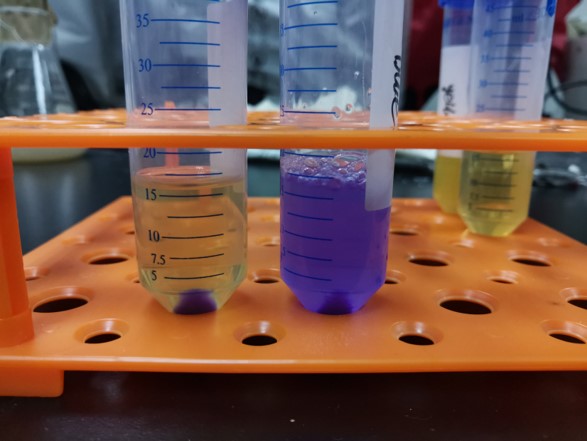Difference between revisions of "Part:BBa K2981007"
(→Usage and Biology) |
|||
| (4 intermediate revisions by 2 users not shown) | |||
| Line 3: | Line 3: | ||
<partinfo>BBa_K2981007 short</partinfo> | <partinfo>BBa_K2981007 short</partinfo> | ||
| − | The secreting peptide Kp-SP was added to the N-terminus of the pigment protein - amilCP, and | + | The secreting peptide Kp-SP was added to the N-terminus of the pigment protein - amilCP, and realized the transition of the amilCP from intracellular to extracellular. |
| − | |||
| − | |||
| + | ===Usage and Biology=== | ||
| + | We fused amilCP to the signal peptide Kp-Sp from actinomycetes and transferred the plasmid into E. coli BL-21. Incubate overnight in LB medium at 37 ° C, 200 rpm. The control group was an amilCP without the fusion signal peptide Kp-Sp. 15 ml of the bacterial solution was taken from each group and centrifuged at 8000 rpm. It was observed that the supernatant of the experimental group showed a clear blue color, the supernatant of the control group had no color, and the value of OD588 was measured. After that, we collected the bacteria of the experimental group. | ||
| + | <br> | ||
| + | We used ultrasonic lysis to measure OD588 using a microplate reader. We found that about 30% of amilCP was secreted outside the cell. | ||
| + | [[File:T--NWU-China--improve-amilCP.jpg|900px|thumb|none|alt=Kp-Sp amilCP.|Figure 1. The left side is the control group and the right side is the experimental group.]] | ||
<!-- --> | <!-- --> | ||
Latest revision as of 14:31, 19 October 2019
The signal peptide Kp-SP was added to the N-terminus of amilCP
The secreting peptide Kp-SP was added to the N-terminus of the pigment protein - amilCP, and realized the transition of the amilCP from intracellular to extracellular.
Usage and Biology
We fused amilCP to the signal peptide Kp-Sp from actinomycetes and transferred the plasmid into E. coli BL-21. Incubate overnight in LB medium at 37 ° C, 200 rpm. The control group was an amilCP without the fusion signal peptide Kp-Sp. 15 ml of the bacterial solution was taken from each group and centrifuged at 8000 rpm. It was observed that the supernatant of the experimental group showed a clear blue color, the supernatant of the control group had no color, and the value of OD588 was measured. After that, we collected the bacteria of the experimental group.
We used ultrasonic lysis to measure OD588 using a microplate reader. We found that about 30% of amilCP was secreted outside the cell.
Sequence and Features
- 10COMPATIBLE WITH RFC[10]
- 12COMPATIBLE WITH RFC[12]
- 21COMPATIBLE WITH RFC[21]
- 23COMPATIBLE WITH RFC[23]
- 25COMPATIBLE WITH RFC[25]
- 1000COMPATIBLE WITH RFC[1000]

